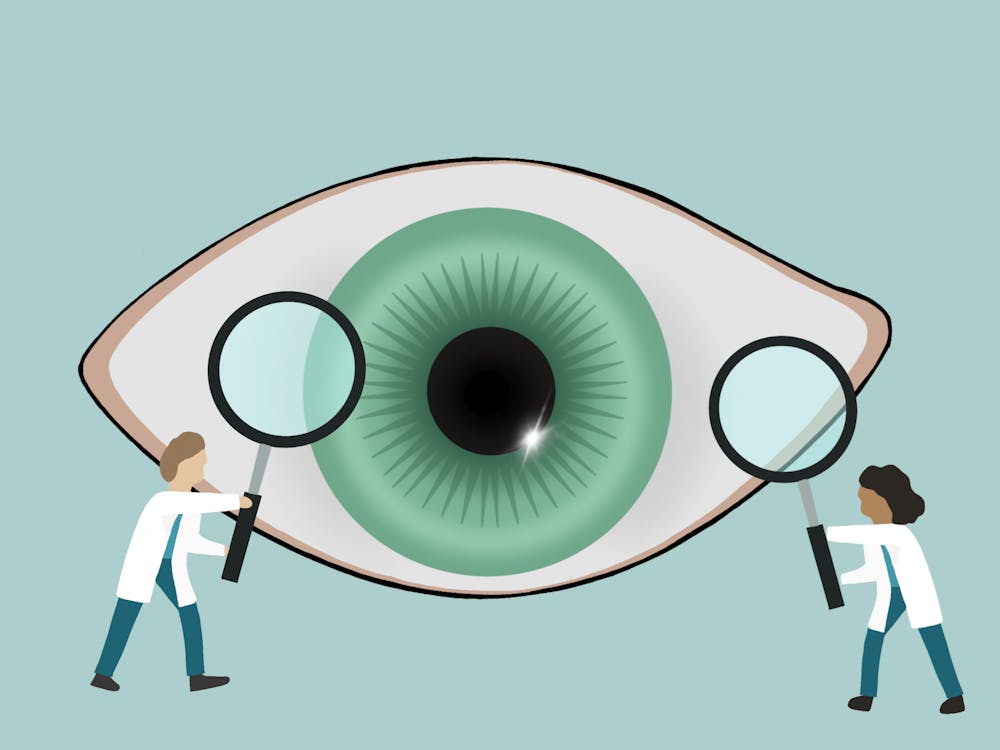Recently-published research by researchers from the School of Medicine suggests taking the first steps towards preventing macular degeneration — a leading cause of blindness for people over the age of 50 — is within closer reach than previously thought.
A team led by Asst. Engineering Prof. Bradley Gelfand has been investigating age-related macular degeneration for the past few years. At the core of their investigation is atrophic AMD, which is the “dry” form of the disease that comprises roughly 85 to 90 percent of the 170 million worldwide AMD cases. This form causes progressive thinning of the macula, a part of the retina that controls sharp, central vision and aids in perceiving color and the buildup of small white or yellow spots on the retina called drusen. While one’s eyesight can worsen if a specialist is not consulted, the majority of individuals suffering from the condition will experience minimal vision loss and slight pigment discoloration.
While there is currently no proven cure for AMD, Gelfand and his team discovered that fluoxetine, an antidepressant commonly known by the brand name Prozac, could possibly aid in limiting the progression of the condition.
“[Fluoxetine] goes into cells and inhibits an inflammatory pathway known as an inflammasome,” Gelfand said. “It essentially reduces the ability of this inflammasome to become activated.”
The particular inflammasome attributed to AMD is NLRP3, which induces inflammation and triggers degeneration of the pigment layer of the retina. Based on their findings, the team believes that fluoxetine could restrict NLRP3 before it begins to develop, effectively preventing the particular inflammatory pathway from generating in the first place.
To conduct their research, the team utilized a two-pronged approach that consisted of research using experimental trials and also using information collected from two large databases storing de-identified patient information for almost 100 million individuals. Using these databases, the team discovered that individuals who were prescribed Prozac exhibited a statistically significant reduction in diagnoses of AMD when compared to individuals who were not prescribed Prozac.
“By looking at the two groups, we found that the rate [of AMD diagnoses] among those who were given Prozac was reduced by somewhere between 10 and 15 percent,” Gelfand said. “A 10 percent reduction in risk of a disease that afflicts many millions of people ends up being a lot of people who, you know, conceivably could be benefiting from this reduced risk.”
The original idea for this particular route of research was devised by Meenakshi Ambati, a senior at Albemarle High School who has won numerous awards at the national and international level. Ambati’s idea was rooted in the concept of drug repurposing, which entails applying a particular drug to a different application than its original, intended use. This concept can be particularly helpful in identifying new uses for drugs that have already been developed, possessing conceivable advantages over concocting an entirely new drug for a particular application.
Asst. Ophthalmology Prof. Shao-bin Wang believes that drug repurposing can be beneficial for a wide range of future research initiatives.
“The idea of repurposing has recently become a new branch of study,” Wang said. “It's a positive development, because we can save a lot of money and time repurposing already-approved drugs.”
After looking at the chemical structures of different drugs, Ambati discovered that the structure of fluoxetine shared an evident similarity to an experimental drug currently being used to study macular degeneration. Due to their similar structure, Ambati hypothesized that fluoxetine could provide the same benefits as the experimental compound. Wang believes that inquiries like Ambati’s will open the door for different studies and future implications.
“Worldwide, there’s a rising approach for research like this,” Wang said. “Many similar studies are going on right now, [including] repurposing NRTI drugs that treat HIV patients and applying it to treat type 2 diabetes.”
While the research conducted by the team is part of a new and exciting frontier in medicine, it is important to remember that these findings should be approached with a certain degree of caution — there are still many unknowns about the relationship between fluoxetine and AMD, and additional study is needed before limitations can be eased and it can be safely recommended as a treatment for the disease.
“I would definitely encourage people not to start taking Prozac for the purposes of treating or preventing their macular degeneration,” Gelfand said. “There are risks associated with taking it, and at this point, the risks outweigh the known benefits.”
Still, the team will continue to explore the role that fluoxetine could play in curtailing the rate of one of the leading causes of worldwide blindness. Lab tests and animal models will need to continue for some time before the thought of human trials can be realized, but the collected research is certainly encouraging.







